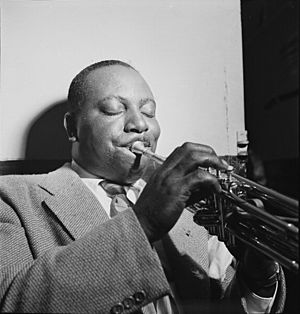Cootie Williams facts for kids
Quick facts for kids
Cootie Williams
|
|
|---|---|

Williams c. 1947
|
|
| Background information | |
| Birth name | Charles Melvin Williams |
| Born | July 10, 1911 Mobile, Alabama, U.S. |
| Died | September 15, 1985 (aged 74) New York City |
| Genres | |
| Occupation(s) | Musician |
| Instruments | Trumpet |
| Years active | 1925–1975 |
| Associated acts | Duke Ellington, Rex Stewart |
Charles Melvin "Cootie" Williams (born July 10, 1911 – died September 15, 1985) was an amazing American jazz trumpeter. He was also known for playing jump blues and rhythm and blues music.
Contents
Cootie Williams: Early Life and Career
Cootie Williams was born in Mobile, Alabama. He started his music career very young, at just 14 years old. He played with a group called the Young Family band. A famous saxophonist named Lester Young was also in this band.
Cootie got his special nickname when he was a little boy. His father took him to a band concert. After the music finished, his dad asked him what he heard. Cootie replied, "Cootie, cootie, cootie!"
Becoming a Star in New York
In 1928, Cootie Williams made his first recordings in New York City. He played with pianist James P. Johnson. He also worked for a short time with bands led by Chick Webb and Fletcher Henderson.
Cootie became very famous when he joined Duke Ellington's orchestra. This was when the band played at the famous Cotton Club. He performed with Duke Ellington from 1929 to 1940. During this time, he also recorded his own music. He sometimes played with other musicians from Ellington's band.
Cootie's Unique Trumpet Style
Cootie Williams was well-known for his special "jungle" style of trumpet playing. This style was similar to how Ellington's earlier trumpeter, Bubber Miley, played. He also used a plunger mute with his trumpet. A plunger mute is a special device that changes the sound of the trumpet. It makes it sound like a voice. Cootie even sang sometimes!
Duke Ellington wrote a special song just for him called Concerto for Cootie. Later, words were added to this song, and it became "Do Nothing till You Hear from Me". Cootie was also the main trumpet player in other Ellington songs. These included "Echoes of Harlem" and "Harlem Air Shaft".
Moving On and Leading His Own Band
In 1940, Cootie Williams joined Benny Goodman's orchestra. This was a very big deal at the time. It caused a lot of excitement in the music world.
Then, in 1941, Cootie started his own orchestra. Many talented young musicians played in his band over the years. Some of these famous players included Charlie Parker, Eddie "Lockjaw" Davis, and Bud Powell.
In 1947, Cootie wrote a song called "Cowpox Boogie." He wrote it while he was getting better from an illness. He had gotten sick from a vaccination. He had made sure all his band members got the same vaccination.
Later Career and Return to Jazz
By the late 1940s, Cootie Williams was not as famous. He had to make his band smaller and eventually stop playing with them. In the 1950s, he started playing more rhythm and blues music. He toured with smaller groups and performed at the Savoy Ballroom.
In the late 1950s, he formed a small jazz group. He recorded several albums with Rex Stewart. He also released his own album called Cootie Williams in Hi-Fi in 1958.
In 1962, Cootie rejoined Duke Ellington's orchestra. He stayed with them until 1974, even after Duke Ellington passed away. In 1975, he performed during the Super Bowl IX halftime show. Cootie Williams was honored in 1991. He was added to the Alabama Jazz Hall of Fame.
Death
Cootie Williams passed away in New York City on September 15, 1985. He was 74 years old. He died from a kidney problem. He is buried at Woodlawn Cemetery in the Bronx, New York City.
Discography
Cootie Williams recorded many albums during his career. Here are some of them:
As leader
These are albums where Cootie Williams was the main artist.
- The Big Challenge (Jazztone, 1957)
- Cootie Williams in Hi-Fi (RCA Victor, 1958)
- Around Midnight (Jaro, 1959)
- Cootie (Decca, 1959)
- Porgy & Bess Revisited (Warner Bros., 1959)
- Do Nothing Till You Hear from ... Cootie (Warwick, 1960)
- The Solid Trumpet of Cootie Williams (Moodsville, 1962)
- Cootie Williams and His Orchestra 1941–1944 (Classics, 1995)
As sideman
These are albums where Cootie Williams played trumpet for another main artist.
- Duke Ellington, All Star Road Band Volume 2 (Doctor Jazz, 1985)
- Joya Sherrill, Joya Sherrill Sings Duke (20th Century Fox, 1965)
See also
 In Spanish: Cootie Williams para niños
In Spanish: Cootie Williams para niños
 | James B. Knighten |
 | Azellia White |
 | Willa Brown |

